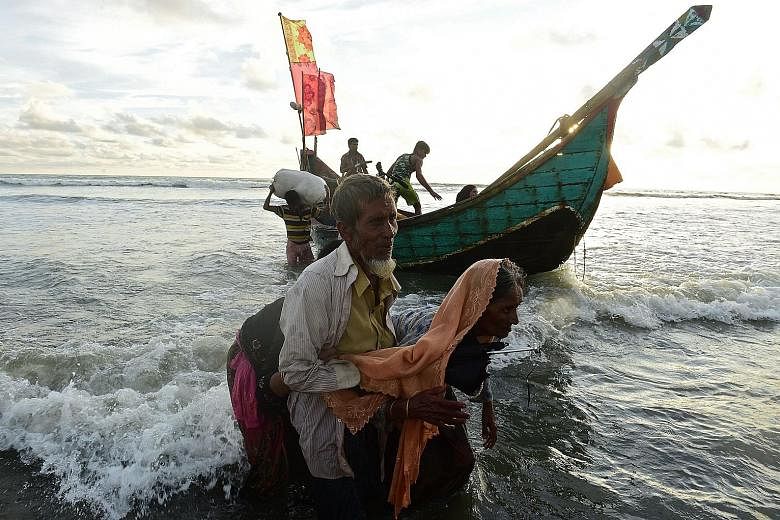SHAMLAPUR • For thousands of Rohingya Muslims, an informal fleet of small fishing boats has meant deliverance from what they say is an indiscriminate assault on their villages by the Myanmar army.
Deliverance, however, comes at a price. Some refugees told Reuters they paid as much as 10,000 taka (S$164) per adult to boatmen to make the five-hour crossing from Myanmar's coast to ports in southern Bangladesh.
While the fishermen say they have a moral obligation to help desperate fellow Muslims escaping persecution, Bangladeshi officials accuse them of profiteering. Ordered to stamp out human trafficking, they have made arrests and even set fire to fishing boats.
Said Mr Mohammed Alom, 25, a fisherman in Shamlapur: "Of course we want to keep going back to rescue more people. Our Muslim brothers and sisters are in a bad situation, so I have to go and bring them out."
About 400,000 Rohingya have arrived in Bangladesh in less than three weeks and people are still coming after attacks by Rohingya militants sparked a fierce counter- offensive by Myanmar's army. Senior United Nations officials have described it as "ethnic cleansing".
The influx is placing a huge strain on south Bangladeshi authorities.
"Don't say rescuers. The rescuers... should rescue people, (but) not in terms of money," said Lieutenant-Colonel Ariful Islam, Border Guards Bangladesh commander in Teknaf on the country's southern tip, referring to the fishermen bringing refugees ashore for money.
"These people are very poor, it's just extorting from them whatever they have. We are helping those who arrived, but we're trying to insist that no human trafficking should take place."
Reuters interviewed fishermen and boat owner-operators who had made visits to Myanmar in recent weeks. The men did not think the profits they made detracted from what they saw as a rescue mission.
Mr Shaif Ullah, 34, said he made 100,000 taka rescuing the family of a Rohingya in Malaysia who paid him via BKash, a popular mobile money service.
"People from Malaysia and Saudi Arabia call me and tell me to go there to get their family," he said. "They are crying for my help. I take money from them, yes, but it's also a humanitarian act."
REUTERS
SEE OPINION

